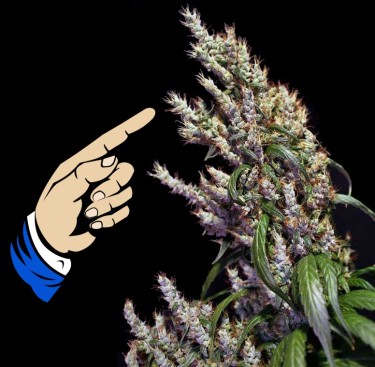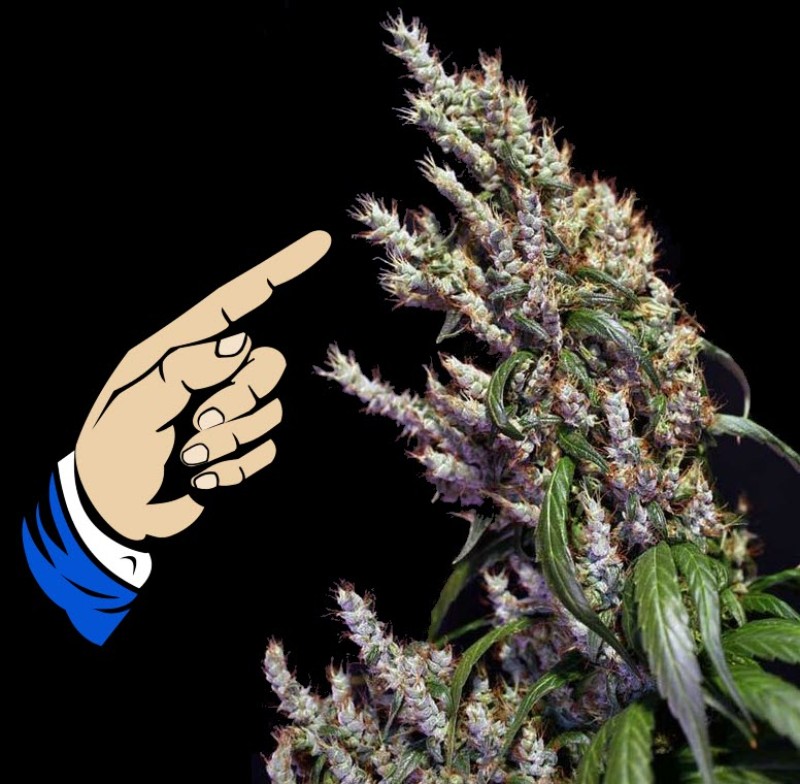
Most growers prefer to have their cannabis buds compact and dense, while a few don't mind having wispy, airy, and elongated buds. It might sound weird, but some farmers actually request seeds of foxtail cannabis plants for their farms. Hence, foxtails in cannabis cannot generally be termed as being good or bad. It depends on the grower's niche.
Genetics and farming practices play a huge role in forming foxtail buds. Farmers that do not want this should purchase the best seeds from trusted seed banks and employ farming practices that do not induce environmental stress on the plants. Cannabis cultivation is not only about the outward appearance of buds but also their potency, weight, flavor, and aroma.
Foxtail Cannabis Plants
First of all, what is foxtailing? Foxtailing is a term used to describe the deformed appearance of cannabis plants. Here, the buds elongate uncontrollably and take an irregular shape. This strange phenomenon affects cannabis plants in their flowering phases.
Foxtails can be pretty alarming to novice growers. As they get confused about whether or not the occurrence is good or bad, Normal cannabis buds have regular shapes with dense buds, while foxtail buds have longer and slender shapes with less dense or wispy buds.
If you search online for "foxtail cannabis plants," you'll be presented with pictures of cannabis plants with their calyxes placed above each other to form tower-like figures. If you look closely, you'll see various thin sugar leaves poking out from beneath the stacked calyxes. This appearance gave rise to the name "foxtails," The delicate sugar leaves provide the buds with a strange, bushy appearance resembling a fox's tail.
What Causes Foxtailing?
Cannabis Science has traced foxtailing to three causative factors. They are genetics, heat stress, and light stress. Once you know the roles these variables play and the best wash to spot them, you'll have a better idea of the foxtailing effect your cannabis crop is developing. There are also preventive and corrective tips you can embrace to get above the situation.
Genetics
Different cannabis strains have individual genes that are different from others. Some cannabis crops possess foxtail genes in dominant or recessive forms—these plants are more likely to foxtail than others. In the last four decades, breeders have experimented with different strains to pinpoint individual characteristics. These breeders insist that foxtailing is one of the major defects resulting from continuous inbreeding. Farmers who prefer to have this trait on their farms said they are happy to produce uncommon or unique flowers. You must purchase your cannabis plants or seeds from respectable companies to avoid growing a genetically predisposed trait.
Light Stress
This is a stressor for indoor-cultivated cannabis crops. Excessive artificial light from LED or HID sources often results in the worst foxtailing effects. Cannabis is a sun-loving plant, and this inspired the use of grow lights to mimic sunlight in indoor grows.
Farmers make the mistake of hanging lights too close to the plants or leaving the lights on at extremely hot temperatures. This quickly induces stress and foxtailing at a later time. It is best to place the grow lights a reasonable distance away from the plant's flowers. The farmers must also modify the temperatures of the light to suit the growth phase of the plant. Experts recommend HID lights over LEDs because they give off less heat.
This affects indoor and outdoor cannabis plants. It is more common than light stress and is a leading cause of foxtailing. Cannabis plants grow best in temperatures ranging from 20° to 30°C, depending on their variety. Extremely low or hot temperatures tend to have adverse effects on the plants. For instance, excessive heat affects a plant's ability to maintain homeostasis. It becomes unable to grow healthy roots, flowers, and buds. It also limits their ability to take up the necessary nutrients needed for growth and productivity.
Cannabis plants can cope with high temperatures for up to two days, but after that, they may start to foxtail.
Good and bad cannabis foxtails
Some strains are genetically predisposed to foxtailing. It is more of a trait for these strains and is referred to as "good foxtailing." On the other hand, bad foxtails occur when the plant suffers from environmental stress. Foxtails are only desirable if the plant's genes induce them. To be sure of your cannabis' foxtails, it is advisable to investigate the underlying cause immediately after the trait is noticed.
For eccentric and pro-foxtail cannabis growers, a few strains you can go for including Blue Cheese and Train Wreck. These strains are genetically predisposed to exhibit foxtail traits in the flowering phase.
How to Correct Foxtailing in Cannabis
Farmers who are not keen on the foxtail traits are advised to try out the following tips to fix the structure of their crops' buds. These tips mainly revolve around reducing stress on your plants, whether or not they are grown indoors or outdoors.
Light Distance Can Be Changed
The first step an indoor cannabis cultivator has to take is to check the distance between the facility's grow lights and the flowers. They must hang from an optimal height of around 29–31 cm from the peak of the canopy. You must also remove excess grow lights, especially the LED lights. HID lights work best to maintain balance for cannabis plants.
Environmental stress includes overwatering, underwatering, too high or low temperatures, pH, EC count, and humidity. When you notice foxtailing or other deformities on your farm, you should check for and regulate the listed factors.
Can Foxtail Buds Be Harvested?
The appearance of foxtails on cannabis plants does not render the plant unfit for consumption. It merely indicates that the plants are stressed. Foxtail buds can be harvested. The issue is that they weigh less than regular buds and are less dense. So, you can harvest them, extract the necessary oils, or even pack them into cones. The foxtails do not mean you wouldn't enjoy the pot.
Bottom Line
If you like foxtails, purchase foxtail cultivars or seeds from renowned seed banks. Try not to induce environmental stress on crops to induce foxtails; it would result in adverse effects. The goal is to have good foxtails or no foxtails.
CANNABIS PLANT TRIMMING, READ MORE...
CANNABIS SUGAR LEAVES, WHAT ARE THEY AND HOW DO YOU CUT THEM?






